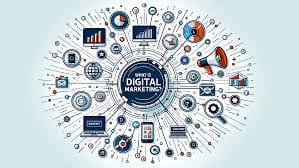Digital Marketing Has Become An Essential Component Of Modern Business Strategy. As Businesses Increasingly Shift Towards Digital Platforms, The Demand For Effective Digital Marketing Strategies Has Grown Substantially. This In-Depth Exploration Of Digital Marketing Will Cover Its Fundamentals, The Key Components, Various Channels, The Importance Of Analytics, The Role Of SEO, Social Media, Content Marketing, Email Marketing, Paid Advertising, And Trends Shaping The Future Of The Industry.
What Is Digital Marketing?
Digital Marketing Is The Promotion Of Products, Services, Or Brands Through Electronic Media, Predominantly The Internet. It Encompasses All Marketing Efforts That Use An Electronic Device Or The Internet, Leveraging Channels Like Search Engines, Social Media, Email, And Websites To Connect With Current And Prospective Customers.
In Contrast To Traditional Marketing, Digital Marketing Offers Businesses A More Interactive And Data-Driven Approach, Enabling Them To Track Customer Behavior, Target Specific Segments, And Adjust Their Strategies In Real Time.
The Importance Of Digital Marketing
Digital Marketing Is Crucial For Businesses Of All Sizes Because It Allows Them To:
- Reach A Global Audience: Digital Marketing Is Not Confined By Geography. It Offers Businesses The Ability To Reach Audiences Anywhere In The World At A Fraction Of The Cost Of Traditional Marketing.
- Cost-Effective: Compared To Traditional Marketing, Digital Marketing Is Far More Cost-Efficient. Pay-Per-Click (PPC) Advertising, Email Marketing, And Social Media Ads Can Often Yield High Returns On Minimal Investment.
- Measure Results Easily: One Of The Biggest Advantages Of Digital Marketing Is The Ability To Measure Campaign Performance In Real Time. Analytics Tools Allow Businesses To Track And Optimize Their Strategies Based On Metrics Like Conversions, Clicks, Impressions, And Customer Behavior.
- Target Specific Audiences: Digital Marketing Allows Businesses To Reach Out To Specific Demographics With Precision. By Analyzing Data Such As Location, Gender, Interests, And Purchasing Behaviors, Companies Can Create Tailored Campaigns That Increase The Likelihood Of Conversions.
- Build Brand Credibility: An Effective Digital Marketing Strategy Helps In Building Trust And Credibility Through Various Online Channels. Customer Reviews, Social Media Engagement, And Well-Executed Content Marketing Efforts All Contribute To An Enhanced Brand Reputation.
Key Components Of Digital Marketing
Digital Marketing Consists Of Various Elements That Work Together To Form A Cohesive Strategy. The Key Components Include:
- Search Engine Optimization (SEO): SEO Is The Process Of Optimizing Your Website To Rank Higher On Search Engine Results Pages (Serps), Thus Increasing Organic Traffic. SEO Involves Various Practices Such As Keyword Research, On-Page Optimization, Technical SEO, And Building Backlinks.
- Content Marketing: Content Marketing Focuses On Creating Valuable, Relevant, And Consistent Content To Attract And Engage An Audience. This Can Include Blogs, Articles, Videos, Infographics, Ebooks, Whitepapers, And More. The Goal Is To Provide Helpful Information That Nurtures Leads Through The Buyer’s Journey And Positions Your Brand As An Industry Authority.
- Social Media Marketing: Social Media Platforms Like Facebook, Instagram, Twitter, Linkedin, And Pinterest Allow Businesses To Engage With Their Audiences Directly. Social Media Marketing Involves Creating And Sharing Content, Running Ads, And Fostering Community Engagement To Build Brand Awareness And Drive Traffic To Your Website.
- Email Marketing: Email Marketing Is The Practice Of Sending Targeted Messages To Your Email Subscribers. It Can Be Used To Nurture Leads, Promote New Products, And Engage With Your Customer Base. Effective Email Marketing Involves Personalization, Automation, Segmentation, And Clear Calls To Action.
- Pay-Per-Click (PPC) Advertising: PPC Is A Form Of Online Advertising Where Businesses Pay A Fee Each Time Their Ad Is Clicked. Google Ads Is The Most Popular PPC Platform, But Social Media Platforms Like Facebook, Instagram, And Linkedin Also Offer Paid Advertising Opportunities. PPC Allows Businesses To Target Keywords, Demographics, And Behaviors For Immediate Results.
- Affiliate Marketing: Affiliate Marketing Involves Partnering With External Websites Or Individuals To Promote Your Products Or Services. Affiliates Earn A Commission For Each Sale Or Lead They Generate, Incentivizing Them To Promote Your Brand To Their Audiences.
- Influencer Marketing: Influencer Marketing Leverages Social Media Influencers And Industry Experts To Promote Your Products To Their Followers. By Partnering With Influencers Who Align With Your Brand Values, You Can Reach A New Audience And Enhance Your Credibility.
- Video Marketing: With The Rise Of Platforms Like Youtube, Tiktok, And Instagram Reels, Video Marketing Has Become An Integral Part Of Digital Marketing Strategies. Videos Can Convey Complex Information In An Engaging Way And Drive Traffic, Engagement, And Conversions.
- Mobile Marketing: As Mobile Internet Usage Has Surpassed Desktop, Mobile Marketing Has Become Increasingly Important. This Involves Optimizing Your Website For Mobile Users, Using SMS Marketing, And Creating Mobile-Friendly Ads.
- Conversion Rate Optimization (CRO): CRO Focuses On Optimizing The User Experience On Your Website To Increase The Percentage Of Visitors Who Convert Into Customers. This Includes Refining Landing Pages, Simplifying The Checkout Process, And Enhancing Website Navigation.
Search Engine Optimization (SEO)
SEO Is The Backbone Of Digital Marketing. It Ensures That Your Website Appears In Search Engine Results When Potential Customers Search For Relevant Keywords. There Are Two Main Types Of SEO: On-Page And Off-Page.
- On-Page SEO: This Involves Optimizing The Content On Your Website, Including Meta Tags, Headings, Keyword Usage, Image Alt Tags, And Internal Linking. The Goal Is To Make Your Site More User-Friendly And Search Engine-Friendly.
- Off-Page SEO: Off-Page SEO Refers To Activities That Take Place Outside Of Your Website But Impact Your Rankings, Such As Building Backlinks From Authoritative Websites, Social Signals, And Online Reviews.
- Technical SEO: This Is Another Aspect That Focuses On Improving The Technical Elements Of A Website, Such As Site Speed, Mobile-Friendliness, Crawlability, And Security, Ensuring Search Engines Can Easily Index And Rank Your Content.
Content Marketing
Content Marketing Is A Vital Element Of Digital Marketing. It Focuses On Creating And Sharing Valuable Content To Attract And Retain Customers. The Most Common Types Of Content Used In Digital Marketing Are:
- Blog Posts: Blogging Is One Of The Most Effective Ways To Boost SEO, Provide Value To Your Audience, And Showcase Your Expertise. Regularly Publishing Blog Posts Helps To Keep Your Website Fresh And Relevant.
- Infographics: These Visual Representations Of Information Are An Engaging Way To Communicate Data, Statistics, Or Processes.
- Video Content: Video Marketing Is An Increasingly Popular Form Of Content Marketing, As It Helps Convey Complex Messages In An Easily Digestible Format. Platforms Like Youtube And Tiktok Have Made It Easier To Share Videos With A Broad Audience.
- Ebooks And Whitepapers: Longer-Form Content, Such As Ebooks And Whitepapers, Is Used To Provide In-Depth Information About Specific Topics. This Type Of Content Is Especially Effective For B2B Marketing, As It Helps Establish Your Brand As A Thought Leader.
- Case Studies: Case Studies Showcase Real-World Examples Of How Your Products Or Services Have Benefited Your Customers. They Are An Effective Tool For Building Trust And Persuading Potential Clients.
Social Media Marketing
Social Media Platforms Are Essential For Building Brand Awareness, Fostering Customer Relationships, And Driving Traffic To Your Website. The Most Popular Platforms Include:
- Facebook: With Over 2.8 Billion Active Users, Facebook Is A Critical Platform For Businesses Of All Sizes. Facebook Ads Allow Businesses To Target Specific Demographics, Behaviors, And Interests.
- Instagram: Instagram Is A Visual-Centric Platform Popular With Younger Audiences. Businesses Use It To Showcase Products, Build Brand Identity, And Engage With Followers Through Posts, Stories, And Reels.
- Linkedin: Linkedin Is A Professional Network Ideal For B2B Marketing. It Is Used For Sharing Industry News, Thought Leadership, And Job Opportunities.
- Twitter: Twitter Is A Platform For Real-Time Communication. It’s Ideal For Sharing News, Updates, And Engaging With Your Audience.
- Pinterest: Pinterest Is A Visually-Oriented Platform Where Users Search For Ideas And Inspiration. It’s Particularly Effective For Businesses In Industries Such As Fashion, Home Décor, Food, And Travel.
Each Platform Offers Different Advertising Options, Including Sponsored Posts, Display Ads, And Video Ads. Understanding Where Your Target Audience Spends Their Time And Tailoring Your Content Accordingly Is Crucial For Social Media Success.
Email Marketing
Email Marketing Remains One Of The Most Effective Channels For Engaging With Customers. It Allows Businesses To Reach Customers Directly And Deliver Personalized, Targeted Messages. Key Aspects Of Successful Email Marketing Include:
- Segmentation: Segmenting Your Email List Based On Demographics, Interests, And Past Behavior Allows You To Send Relevant Content To Specific Groups Of People.
- Personalization: Personalized Emails Have A Higher Open And Click-Through Rate Than Generic Messages. Including The Recipient’s Name, Tailored Product Recommendations, And Personalized Offers Can Significantly Improve Engagement.
- Automation: Automating Email Campaigns Helps Save Time And Ensures That The Right Message Is Sent To The Right Person At The Right Time. Automated Email Workflows Are Commonly Used For Welcome Emails, Abandoned Cart Emails, And Follow-Up Sequences.
- A/B Testing: A/B Testing Involves Sending Two Versions Of An Email To See Which One Performs Better. This Allows You To Optimize Subject Lines, Calls-To-Action, And Content Layout.
Pay-Per-Click (PPC) Advertising
PPC Advertising Is A Form Of Online Advertising Where Businesses Pay A Fee Each Time Their Ad Is Clicked. Platforms Like Google Ads, Facebook Ads, And Linkedin Ads Allow Businesses To Target Specific Audiences Based On Keywords, Demographics, And Interests.
- Google Ads: Google Ads Allows Businesses To Create Ads That Appear On The Google Search Results Page Or Across Google’s Display Network. By Bidding On Keywords, Businesses Can Show Their Ads To Users Who Are Actively Searching For Products Or Services Like Theirs.
- Facebook Ads: Facebook Offers Highly Targeted Advertising Options, Allowing Businesses To Target Users Based On Their Interests, Behaviors, And Demographics.
- Linkedin Ads: Linkedin Ads Are Particularly Effective For B2B Companies, Offering The Ability To Target Users Based On Their Job Title, Industry, And Company Size.
- Retargeting: Retargeting Ads Are A Powerful Tool In PPC Marketing. They Allow Businesses To Show Ads To People Who Have Already Visited Their Website, Increasing The Chances Of Converting Them Into Customers.
Affiliate And Influencer Marketing
Affiliate Marketing And Influencer Marketing Are Two Strategies That Rely On Partnerships To Drive Traffic And Sales.
- Affiliate Marketing: In Affiliate Marketing, Businesses Partner With Affiliates Who Promote Their Products Or Services In Exchange For A Commission. Affiliates Can Be Bloggers, Influencers, Or Other Businesses That Share Similar Target Audiences.
- Influencer Marketing: Influencer Marketing Involves Partnering With Social Media Influencers Or Industry Experts To Promote Your Brand. Influencers Have Established Credibility With Their Followers, And Their Endorsement Can Help Build Trust And Reach New Audiences.
The Role Of Analytics In Digital Marketing
Analytics Play A Critical Role In Digital Marketing, Providing Insights Into How Campaigns Are Performing And Where Improvements Can Be Made. The Most Common Metrics Tracked In Digital Marketing Include:
- Traffic: Understanding Where Your Website Traffic Is Coming From (Organic, Paid, Social, Referral) Helps You Identify Which Channels Are Driving The Most Visitors.
- Conversion Rate: This Measures The Percentage Of Visitors Who Take A Desired Action, Such As Making A Purchase Or Filling Out A Contact Form.
- Click-Through Rate (CTR): CTR Measures How Often People Click On Your Ads Or Links In Emails. A High CTR Indicates That Your Messaging And Targeting Are Effective.
- Bounce Rate: The Bounce Rate Represents The Percentage Of Visitors Who Leave Your Site After Viewing Only One Page. A High Bounce Rate Could Indicate That Your Website Needs Improvements.
- Return On Investment (ROI): ROI Measures The Profitability Of Your Marketing Campaigns. By Comparing The Revenue Generated From A Campaign To Its Cost, You Can Determine Its Effectiveness.
The Future Of Digital Marketing
As Technology Continues To Evolve, So Does The World Of Digital Marketing. Some Emerging Trends That Are Shaping The Future Of The Industry Include:
- Artificial Intelligence (AI): AI Is Transforming Digital Marketing By Automating Tasks, Personalizing Customer Experiences, And Analyzing Data. AI-Powered Chatbots, For Example, Can Provide Instant Customer Support, While Machine Learning Algorithms Optimize Ad Targeting And Content Recommendations.
- Voice Search: As Voice Assistants Like Siri, Alexa, And Google Assistant Become More Popular, Optimizing For Voice Search Is Becoming Essential. This Requires A Focus On Long-Tail Keywords And Natural Language Queries.
- Video Marketing: Video Content Is Expected To Dominate The Digital Landscape In The Coming Years. Live Streaming, Interactive Videos, And Short-Form Video Content Are Increasingly Becoming Central To Social Media Strategies.
- Augmented Reality (AR) And Virtual Reality (VR): AR And VR Are Emerging As Powerful Tools In Digital Marketing, Particularly In Ecommerce And Experiential Marketing. Brands Can Use AR And VR To Offer Virtual Try-Ons, Interactive Product Demos, And Immersive Brand Experiences.
- Data Privacy And Compliance: With The Rise Of Data Breaches And Privacy Concerns, Consumers Are Becoming More Aware Of How Their Data Is Being Used. Marketers Need To Prioritize Transparency And Ensure Compliance With Regulations Such As The General Data Protection Regulation (GDPR).
Conclusion
Digital Marketing Is An Ever-Evolving Field That Requires Businesses To Stay Agile And Informed About The Latest Trends And Technologies. By Understanding The Key Components Of Digital Marketing—SEO, Content Marketing, Social Media, Email Marketing, PPC Advertising, And More—Businesses Can Create Comprehensive Strategies That Attract, Engage, And Convert Their Target Audience.
Success In Digital Marketing Comes Down To Understanding Your Audience, Leveraging The Right Tools And Channels, And Continually Optimizing Your Efforts Based On Data And Analytics. As Technology Advances, Businesses That Stay Ahead Of The Curve By Embracing AI, Video Content, Voice Search, And Other Emerging Trends Will Have The Competitive Edge In This Digital Age.
# Digital marketing hashtagGoogle Ads hashtagOn-Page SEO hashtagPinterest Marketing hashtagSocial Media Marketing Manager
hashtagWordPress Website Design & Development
hashtagYoutube Video SEO hashtagYoutube Video Creator hashtagB2B Lead Generation hashtagGoogle My Business hashtagAffiliate Marketing hashtagSearch Engine Optimization hashtagSearch Engine Marketing hashtagContent Marketing hashtagBRANDING hashtagADVERTISING # BUSINESS MARKETING hashtagWEBSITE hashtagDIGITAL hashtagSOCIAL MEDIA hashtagSOCIAL hashtagYOUTUBE hashtagVIDEO hashtagWORDPRESS hashtagFACEBOOK





